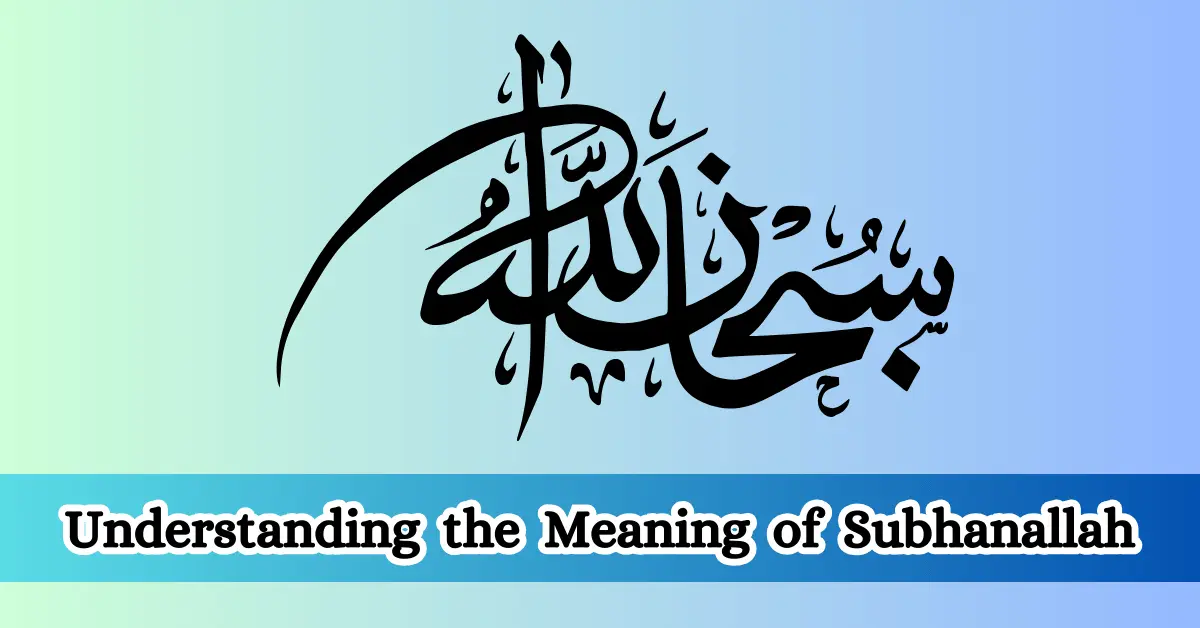In the Islamic faith, many beautiful phrases and prayers hold great significance. One of the most well-known and frequently used is “Subhanallah,” which translates to “Glory be to God” in English. In this article, we will explore the meaning of Subhanallah, its history, and its importance in Islamic culture.
The whole universe and everything in it bear witness to the fact that the One who created it and the one who is guarding and protecting it is free from every defect and weakness. Every particle of the universe glorifies Allah Almighty, Subhanallah. With every rising and setting sun, everything in the universe glorifies Allah Almighty with praise, Subhanallah.
Man is the caliph of Allah Almighty on earth, apart from the noble creatures. He should have recited Tasbeeh the most Subhanallah, but unfortunately, he is oblivious to the remembrance of his Creator and Master; Man does not know what Subhanallah means.
In return for the blessings that Allah Almighty has bestowed on human beings, there is still less, even if we continue to spend our whole lives glorifying and praising. Every day, when the sun rises and rises, there is nothing left in the universe of Allah’s creatures that does not worship and praise Allah except the devils and the heedless human beings.
Understanding the Meaning of Subhanallah
The phrase Subhanallah is an Arabic term often used in prayer and worship by Muslims worldwide. It expresses praise, admiration, and gratitude towards Allah, the one and only God in Islam. The word “Subhan” means “glory” or “purity,” while “Allah” is the Arabic word for God.
When Muslims say Subhanallah, they are acknowledging Allah’s greatness, power, and perfection. It is a way of recognizing that Allah is beyond any imperfection or flaw and that He is the source of all goodness and beauty in the world.
The History of Subhanallah
The use of Subhanallah can be traced back to the early days of Islam when the Prophet Muhammad (peace be upon him) began receiving revelations from Allah. The phrase is mentioned several times in the Holy Quran, often in conjunction with other praises and blessings towards Allah.
Over time, Subhanallah became a central part of Islamic prayer and worship and is now used by Muslims all over the world. It is often recited during the five daily prayers and other moments of reflection and contemplation.
The Importance of Subhanallah in Islamic Culture
Subhanallah holds a special place in Islamic culture. It is a powerful reminder of Allah’s greatness and majesty. By reciting this phrase, Muslims can connect with their faith and deepen their understanding of Allah’s power and wisdom.
In addition, Subhanallah is often used as a form of dhikr, or remembrance of Allah. By repeating this phrase over and over, Muslims are able to focus their thoughts and energies on their faith and block out distractions and negative thoughts.
Subhanallah Meaning

Subhanallah means, “The essence of Allah is free from all defects and defects.” Or “The essence of Allah is pure from all the faults that the ignorant people attribute to Allah.”
The Holy Prophet (saw) said: Remember Allah so often that people call you crazy. Hazrat Mu’adh ibn Jabal has narrated that the last thing I noted while parting from the Hazrat Muhammad (saw) was: I asked: Which deed is most pleasing to Allah Almighty? Hazrat Muhammad (PBUH) said: The most desirable thing is that when you die, your tongue should be wet with the remembrance of Allah.
Hazrat Muhammad (PBUH) said: Some people will remember Allaah on the remaining beds in this world, and He will give such distinguished ranks (of Paradise). It is narrated from Hazrat Umm Ana that she said in the presence of the Holy Prophet (saw): Ya Rasool Allah! Can you inspire me a will?
He said: Forsake sins; this is the best migration and jihad by performing duties. Mention Allah Almighty as much as possible. You cannot offer anything more pleasing to Allah Almighty than the abundance of remembrance.
Subhan Allah in Hadith
- Hazrat Jabir (RA) meaning of subhanallah that Hazrat Muhammad (PBUH) said: Who said: “subhanallahil Azeem wa bihamdihee “For this a palm tree was planted in Paradise.
- There is a narration from Hazrat Abu Huraira, who narrates that one day, he was planting a tree. The Holy Prophet passed by them. He said: O Abu Huraira! What are you doing? I replied: I am planting a tree. He said: can I ask you for a better tree? I said: ‘O Prophet! Why not. He said: “subhanallahi wal hamdulillahi wa la ilaha illallahu wallahu akbar“In exchange for each of these words, a tree will be planted for you in Paradise.
- Hazrat Abo Horaira (RA) narrates that Hazrat Muhammad (PBUH) said: My saying “subhanallah, alhamdulillah la ilaha illallah allahu akbar” is more dear to me than all the things on which the sun rises.
The fact is that we should always glorify our Creator. But there are moments when you see them; the Tasbeeh comes out of your mouth involuntarily. Man is compelled to say, Subhan Allah. As:

The virtue of remembrance of Allah
- Allah Almighty says that I deal with I am with my servant when he thinks of me. When he mentions me. If he mentions me (secret remembrance) in his heart, I also mention him (secretly). If he mentions (remembrance) in the congregation, then I will mention him in the congregation better than his congregation.
- Hazrat Muhammad (PBUH) said: Whoever gets up from his seat does not mention Allaah in this assembly, and whoever lies down in bed does not mention Allaah. So he, too, will be ashamed of Allah.
- Hazrat Muhammad (PBUH)said: If one man has dirhams and is distributing them and the other remembers Allaah, then the one who remembers Allaah (in both of them) will be better.
Conclusion
When amazing things happen, we must glorify our God at such moments. When we see the colors of this universe, we must say Subhan Allah.
When we observe scientific wonders, we must say Subhan Allah. Even observing our existence, we must cry out to Subhan Allah.
Subhanallah is a beautiful and powerful expression of praise and gratitude towards Allah. By understanding its meaning and significance, Muslims can deepen their connection with their faith and strengthen their relationship with Allah.
As we have seen, Subhanallah has a rich history in Islamic culture and is still widely used today as a form of prayer and worship. Whether you are a lifelong Muslim or simply interested in learning more about this fascinating faith, the phrase Subhanallah is a great place to start.
So, the next time you find yourself in a moment of reflection or contemplation, recite Subhanallah and experience the power and beauty of this timeless Islamic prayer.
Frequently Asked Questions
Q: What does Subhanallah mean?
A: Subhanallah is an Arabic phrase that means “Glory be to God.”
Q: How is Subhanallah used in Islamic prayer?
A: Subhanallah is often recited during the five daily prayers and during other moments of reflection and contemplation.
Q: Why is Subhanallah important in Islamic culture?
A: Subhanallah is a powerful reminder of the greatness and majesty of Allah and is often used as a form of dhikr, or remembrance of Allah.
Q: Is Subhanallah mentioned in the Holy Quran?
A: Subhanallah is mentioned several times in the Holy Quran, often in conjunction with other praises and blessings towards Allah.
Q: How can I incorporate Subhanallah into my daily life?
A: You can incorporate Subhanallah into your daily life by reciting it during your prayers or using it as a form of dhikr throughout the day.
